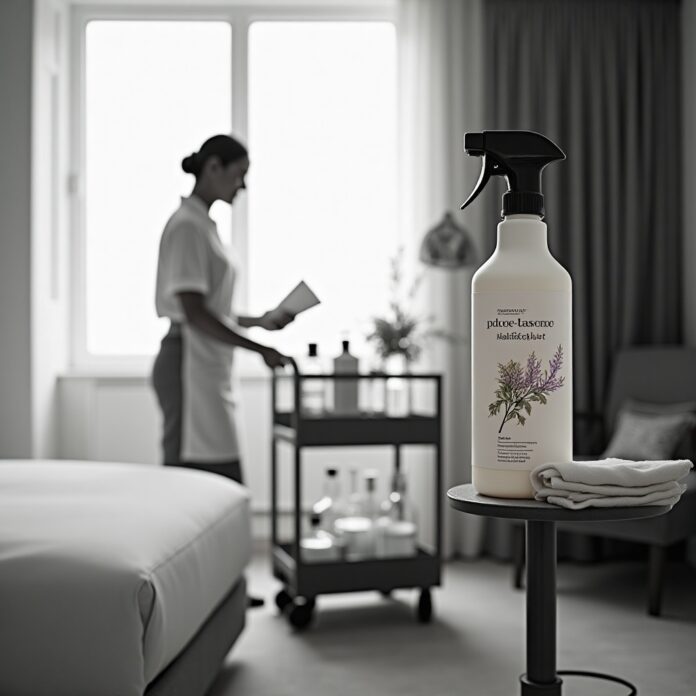The Rise of Eco-Friendly Cleaning Products
Picture this: A traveler walks into a hotel room and breathes in the crisp, clean scent of lemongrass—not a whiff of chemical harshness. They notice a small card on the desk: *“Our cleaning products are 100% eco-friendly, locally sourced, and certified safe for you and the planet.”* Instantly, they feel good about their stay. This isn’t just a fantasy; it’s the reality shaping the $379 billion global eco-cleaning market projected by 2032, growing 8–12% annually as hotels scramble to meet a surge in eco-conscious demand 16.
Why hotels? Because 78% of travelers now prioritize sustainability when booking accommodations. They’re not just seeking a place to sleep—they want to align their values with brands that care. Hotels are racing to ditch harsh chemicals and plastic waste, creating a golden opportunity for entrepreneurs to fill this gap with innovative, planet-friendly solutions. Think allergen-free sprays for sensitive guests, industrial-strength floor cleaners that leave zero toxic residue, or refillable dispensers that slash single-use plastic. The hospitality industry isn’t just cleaning rooms anymore—it’s cleaning up its act, and your business can be the hero they need 311.
Local Ingredient Sourcing: Building a Sustainable Supply Chain
Let’s talk about the secret sauce: local ingredients. Imagine crafting a multi-surface cleaner using lavender from a nearby farm or citrus extracts sourced from regional orchards. This isn’t just poetic—it’s practical. Local sourcing cuts transportation emissions by up to 25% and strengthens community ties, turning suppliers into partners. Take GreenClean Innovations, a startup that partners with organic cooperatives to source biodegradable surfactants. Their “farm-to-bottle” model ensures ingredients stay potent (no cross-continental shipping degrading quality) and supports rural economies 6.
But it’s not all sunshine. Seasonal availability can throw a wrench in production. Solution? Preserve raw materials during peak harvests or design flexible formulas—like a winter-friendly cleaner swapping summer citrus for pine oil. Bulk purchasing and long-term contracts with local farms also keep costs predictable. For example, buying vinegar in 500-gallon drums can slash expenses by 30%, a win for your budget and the planet 7.
The takeaway? Local isn’t just a buzzword—it’s a competitive edge. Hotels crave stories to share with guests, and “made with ingredients from your backyard” is marketing gold.
Chemical Safety Tests & Certifications
Here’s the hard truth: “natural” on a label means nothing without proof. Enter certifications—the trust badges that separate greenwashed products from the real deal. The EPA’s Safer Choice label is the holy grail, vetting every ingredient for human and environmental safety. Then there’s Green Seal, which audits a product’s entire lifecycle, from factory emissions to recyclable packaging. Want to impress hotels? Get these stamps of approval 210.
Testing is non-negotiable. Third-party labs should verify your formulas for biodegradability (breaking down in 28 days or less), aquatic safety (LC50 toxicity levels >10 mg/L), and pH neutrality (between 4–9.5 to avoid corrosive damage). Take Ecochem’s enzyme-based disinfectants: They aced Design for the Environment (DfE) standards by proving they kill germs without harming waterways. Bonus? Certifications simplify B2B sales—hotels facing stricter regulations need these guarantees to comply 58.
Product Development for Hotel Clients
Hotels aren’t just buying cleaning products—they’re buying solutions. A luxury resort needs a streak-free glass cleaner for floor-to-ceiling windows. A budget motel wants a single concentrate that handles bathrooms, kitchens, and lobbies. Your job? Cater to both.
Start with multi-purpose formulas. Eco-Greener Multi-Purpose Cleaner (a hit in hospitality) uses organic coconut-derived surfactants to tackle grease, grime, and germs without damaging marble countertops or hardwood floors. For high-traffic areas, offer concentrated versions—1 gallon makes 50 gallons of solution, reducing shipping weight and storage space. Fragrance-free options are key too; 45% of guests report chemical sensitivities, and a scentless disinfectant could be their saving grace 611.
Packaging matters. Swap single-use plastics for sugarcane-based compostable bottles or sleek refillable aluminum containers. Install bulk dispensers in housekeeping carts—one hotel chain cut plastic waste by 80% this way. And don’t forget cold-water detergents: They save hotels 30% on energy bills, a selling point that turns janitorial staff into eco-advocates 37.
Marketing Strategies to Attract Hotels
You’ve got the product—now make hotels fall in love. Start with storytelling. Draft a “Behind the Scenes” video showing your lavender fields or a lab technician testing pH levels. Hotels eat this up; it gives them content to share with guests craving authenticity.
Target decision-makers where they live: trade shows like Greenbuild International Conference or LinkedIn groups for hospitality sustainability managers. Offer free trials—a 30-day supply of your restroom disinfectant with a satisfaction guarantee. Once hooked, upsell subscription models for refills, locking in long-term contracts 611.
Leverage certifications in every pitch. “Our floor cleaner is Safer Choice certified, ensuring your staff’s safety and aligning with Hilton’s Travel with Purpose goals.” Pair this with data: “Switching to our products reduced Hotel X’s carbon footprint by 12% in six months.” Case studies are your best friend—collect testimonials and share them everywhere, from your website to industry webinars 38.
Scaling & Long-Term Growth
Scaling sustainably means thinking beyond the first sale. Apply for grants like USDA’s BioPreferred program, which funds biobased product innovation. Crowdfunding platforms like Kickstarter can also pre-sell new lines—a UV disinfectant spray, for instance—while gauging market demand 10.
Expand strategically. Develop private-label products for boutique hotels craving exclusivity. Partner with eco-conscious cleaning services for bundled offers—think “Green Cleaning Package” with your products and their staff training. And watch trends: Enzyme-based cleaners are surging, and waterless formulas (just add water on-site!) could be your next hit 67.
Building a Legacy of Sustainability
The future of cleaning isn’t just green—it’s necessary. By marrying local sourcing, rigorous safety standards, and hotel-tailored innovation, your business can ride this wave while leaving a legacy. Remember, every bottle sold isn’t just a product—it’s a step toward a world where hotels don’t just host guests; they heal the planet. Ready to make that impact? Start today


